English Vocabulary for Violence
This page practices some vocabulary for violence that can help you understand English news reports.
It is an unhappy fact that a large part of the news is about bad things that happen.
The more horrible the facts are, the more information the media assumes people want to hear.
The reason for this practice page is that you may find such news articles very difficult to read without knowing some of these less well-known words that newspapers use for their shock value.
Try reading the first few paragraphs of the New York Times article with the link below the next heading. If it’s not too hard, you don’t need this practice.
If it seems very hard to understand, practice the violence vocabulary on this page, and read this explanation of newspaper terms. Then read the New York Times article again. It will still be difficult—but much more possible to understand, I hope.
Warning
The words I try to explain below are mostly terrible words. I think it's important to understand what you read, so I have tried to explain them.
However, you may be able to picture the violence, and it could upset or frighten you. (It could also make you angry!)
I am sorry these action are common enough to need explanations. Please don't read this page if you are a victim and it might awaken memories. Use your judgment. It might be better to just look up one word at a time, and only if you really need to know it.
A News Article that Demonstrates this Vocabulary
I wanted to offer a fairly recent perspective on the Holocaust—the Nazi’s deliberate killing of millions of Jews during World War 2. I found this article in the New York Times worth sharing for two reasons.
(1) It provides some information on what American reporters (“news correspondents”) and the American government knew during the war years about what the Nazis were doing to the Jews of Europe.
(2) It also examines why the New York Times “buried” that information in its back pages, rather than putting it on the front page. (Most such horrible actions—especially by an enemy nation—would get front page coverage and lots of analysis. Newspapers want their readers to understand what’s happening—and to be shocked into action.)
However, the owners of the New York Times in the 1940s were Jewish, and they did not want to appear to be giving special attention to the Jews of Europe over other groups who were also suffering. They may have felt that their readers would suspect them of bias if they emphasized Hitler’s treatment of the Jews.
The U.S. government also had reasons to downplay the magnitude (huge size) of the disaster. It (like several other governments) had refused to allow Jews to immigrate to the U.S. in the 1930s when the danger first became clear. Many thousands could have escaped if they had found a country that would accept them.
However, at the time the American government had been more concerned about controlling immigration. So the U.S. would also look bad if it publicized the huge numbers of Jews being murdered by the Nazis.
Vocabulary for Violence: Some Explanations
Words for killing: bloodshed, execution (usually official, government-ordered killing), homicide (the deliberate murder of one person by another), massacre (killing of a large number of people), murder, slaughter.
To slay also means to
kill (adjective: slain). Starvation is death from hunger (verb: to starve); gassing
is murder or injury from poisonous gas. Fatalities are people killed. (Fatal means deadly.)
Complete destruction (or intended destruction) of a whole group of people—“wiping them out”: annihilation, genocide, extermination (also used for “getting rid” of unwanted insects. It comes from ‘terminate’—to end something.)
Ethnic “cleansing” is an effort of one group of people in a nation to exterminate (“cleanse” their nation of) rival ethnic groups—people of a different race, language, culture, or religion who live in the same area.
Gas chambers—buildings designed by the Nazis to kill large numbers of people using poisonous gasses.
Violence that may not cause death:
An atrocity is a large scale, unnecessarily cruel or brutal act. (Similar words: barbarity—something only uncivilized barbarians would do, or enormity—so big and awful it is hard to imagine.)
Adjectives to describe such events include: atrocious (sometimes used for less serious things like gossip: “Didn’t she look atrocious in that red coat?”), barbarous, brutal, cruel, ghastly, gruesome (especially bloody or disgusting), horrible, horrifying, terrible or terrifying.

To assail, assault, or attack is to try to injure or kill someone (the actions are called assault or attack; the people doing the violence are assailants or attackers and the person being attacked is a victim. (Adjectives: assailed, assaulted, attacked, victimized.)
Other verbs for doing harm (followed by their nouns and then adjectives in parentheses) include: to harm (harm, harmful), to hurt -- to cause harm (--not usually used as a noun, adjs: hurt-- injured or hurtful), to injure (injury, injured—hurt, wounded or injurious—causing harm).
To maim (--, maimed) is to cripple a person: to badly damage or destroy an arm or leg, hand or foot. To rape or violate a woman is to attack and have forcible sex with her. (Nouns: rape and rapist—the person who commits rape, adjs: raped or violated.)
To threaten is to suggest harm to someone if they do not cooperate— to try to force them to obey because of fear. (The noun is threat; the adjectives are threatening—describing the danger, or threatened—describing the person or thing that could be harmed or destroyed. So innocent people may be 'threatened' by a 'threatening' troop movement.)
Terrorism is using violence to scare (terrorize) people enough to get them to do what the terrorists want. Terrorism is usually used by fairly small groups of people fighting against people or countries with more money and weapons.
Weapons (sometimes called 'arms' as in 'the arms race' or 'nuclear arms') are tools used to hurt or kill: guns, knives, bombs, etc.
More Vocabulary for the Holocaust-- & Today's Violence
allies— nations (or people) on the same side in a war or conflict. (Enemies are people on the other side.)
In World War 2, "The Allies" (including the U.S., the U.K., its colonies and Commonwealth members, the U.S.S.R., and others) were nations that opposed the "Axis" powers (Germany, Italy, and Japan).
Anti-Semitism (adj.: anti-Semitic)—prejudice or actions against Jews.
Civilians are non-military—the ordinary people of a country, as compared to soldiers.
A haven is a refuge—a place of safety. ‘Asylum’
(and sanctuary) can have similar meanings. Other nations may grant asylum—a safe
place to stay—to people threatened in their own countries.
Refugees are people who flee (leave or run away in fear) their home countries due to danger or disaster.
To survive is to live through an awful experience, and survivors are the people still alive afterwards.
There is an interesting (and easier) Washington Post article using some of this vocabulary. It compares violence to a contagious (easily spread) disease. The author thinks that society may be better able to control violence by using public health methods to detect potential trouble, then using trained 'interrupters' to help people deal with their anger and problems in better ways.
See Understanding the News in English for terms for media (various news sources) and ways of reporting the news. The page on War Vocabulary has terms related to the military, battles, weapons, and warfare in general.
Home> How to Learn Professional Vocabulary > Vocabulary for Violence.
Didn't find what you
needed? Explain what you want in the search box below.
(For example, cognates, past tense practice, or 'get along with.') Click to see the related pages on EnglishHints.
| site search by freefind | advanced |






